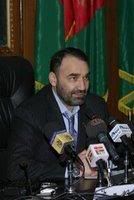“Balkh Province Would Support Central Government”
So says General Atta, the current governor of Balkh, in the northern part of Afghanistan.
On Sunday, February 3, 2008, the Kabul Police lifted a brief blockade around the house of the former ethnic Uzbek, Abdul Rashid Dostum, in Kabul. After Dostum’s armed men beat up Akbar Bay, a former ally.
Dozens of police, armed with assault rifles and machine guns mounted on pick-up trucks, surrounded Dostum's house in a comparatively high-class part of Kabul and other officers took up positions on the roofs of neighboring houses. One shot was fired, but it was unclear where it came from. Shortly afterwards, police began to withdraw.
Akbar Bay himself has a checkered past. He spent the years of the Soviet occupation abroad, and in 1989, he was arrested in the United States and later convicted of drug smuggling and tax evasion. He remained in prison until 2003, when he was released and came back to Afghanistan, where he took a key position in Dostum's party, Junbesh-e-Islami.
Akbar Bay shortly after being allied with General Dostum, joined the choir of voices in opposition to him, accusing him murder and other atrocities during the civil war of the early 1990’s, and even claimed he plotted an armed insurrection against the present government.
In about 2005, Dostum’s supporters marched against Akbar Bay in the province of Jawjozjan, Dostum’s birthplace, and burned down Akbar Bay new politic office.
When Kabul Police lifted the blockade around Dostum’s house on February 3rd, one of his spokesmen called it a plot against Dostum and added that “the government is trying to undermine him”, he continued, “the government should know that if it tries to capture Dostum, then seven or eight provinces in the north would turn against the government”. Spokesman Mohammad Alem Sayeh, also a member of parliament, was giving a warning to the central government.
Since General Dostum, the leader of the ethnic Uzbeks had played very important roles in the 1990s, bringing down the last communist regime and later in 2001 pulling out the Taliban, the central government and almost the majority of the political parties felt fear when they heard the spokesman say that about seven or eight provinces would turn against the Karzai government.
The good news for Karzai and his government was General Atta’s last speech. He is the current governor of Balkh province, which is the main center of northern Afghanistan. General Atta Mohammad Noor is known as the most educated governor in Afghanistan. Balkh Province under his leadership is considered one of the most peaceful in the whole of Afghanistan.
Governor Atta, besides calling for a management meeting in his province to demonstrate support for the central government, had an interview this morning February 5, 2008 with BBC Persian news. He said that whatever Dostum’s spokesman talked about on behalf of the northern cities are just their own ideas, and added “Balkh province will support the central government and we do not want any bloodsheds and civil war to be repeating again and our country became as a state of feudalist regime.”
General Atta continued in his interview with BBC, which was less then four minutes. “Politicians kissing feet and hands while they serve in high position of government, although after they are dismissed they immediately turn against the government and start to make threats. Nobody has the right to speak on behalf of northern cities or decide for them. We need national unity and have many different ethnicities that live in every city of northern Afghanistan. I am just a worker who is being hired by the central government and it’s my job to protect the central government.”
Presently Dostum is a strong member of Northern Alliance (United Front), which is lead by Prof. Rabbani, former president of Afghanistan, in opposition to the Karzai government.



